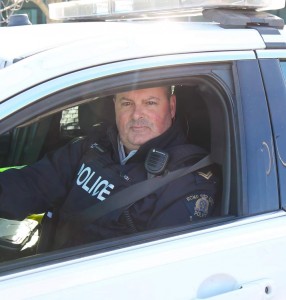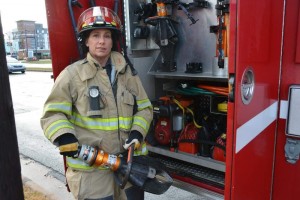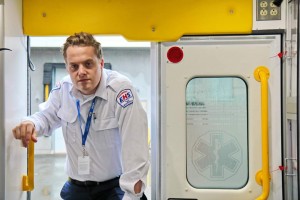**** RCMP Media Release
Today is the National Day of Remembrance for Road Crash Victims. To remember the victims and highlight the importance of road safety, we’ll be sharing first responders’ experiences throughout the day.
Here’s RCMPNS Cpl. Dal Hutchinson’s story.
Several years ago on a Fall evening, I was dispatched to a fatal collision on a 100 series highway. Other RCMP members were already on scene, but I was required to attend as well since I was the shift supervisor.
En route, I learned that the person killed was someone I knew.
When I arrived, I saw a group of firefighters standing behind the fire truck. Two of my co-workers met me and gave me more details.
Then I saw the victim lying covered in middle of the highway. Next to the victim, I saw an item of clothing that they were known to wear. The victim had been wearing it every other time I had seen them. The image of the victim’s covered body next to that signature piece of clothing is something I’ll never forget.
There was a lot going on – phone calls to make, radio transmissions, coordinating the collision scene – but my colleagues, who I deeply respect, had it under control.
We decided that another member and I would do the next of kin notification together. This is something every police officer dreads, but we work hard to do it with respect and professionalism, as we know it leaves a lasting impression on loved ones.
Heading to the victim’s front door, no words were spoken. Our hearts were aching as we prepared to deliver the most upsetting news possible. When the door opened, we were invited inside and shared what had happened.
We stayed for about two hours to help make phone calls and offer comfort and support. As we were preparing to leave, another RCMP member arrived. He was carrying the clothing item that I had noticed at the collision scene earlier. Everyone at the home knew the item’s significance, so when it was given to the victim’s loved one, the room went silent.
First responders are impacted by the tragedies we see and we grieve for those who have lost loved ones. On this National Day of Remembrance for Road Crash Victims, I ask you to take a moment to remember those killed or seriously injured on our roads. Life is too short. Embrace every day and please drive safely.
******
Here’s Halifax Regional Fire & Emergency Captain Andréa Speranza’s story.
I have been responding to motor vehicle collisions for that past 25 years. Each one of them is devastating for those involved. Whether it’s losing control of your car and driving into a tree or other vehicles, the impact is real. Despite having responded to hundreds of accident scenes, the scope of the devastation never escapes me. An accident doesn’t just affect the victim. The traumatic event is also felt by family, friends, and the first responders who jump into action to help.
Early in my career I responding to a call that stays clear in my mind today. I remember that it was winter and the road conditions were icy. A car with four kids inside flipped and landed in a lake. The car was sinking.
When we arrived, two girls were screaming in the back seat. We got them out immediately. The boy in the front passenger seat died from the impact and the driver couldn’t move because of the way the car slammed into the water. The vehicle was sinking fast and we couldn’t get the boy out.
To buy some time, we resorted to giving the boy a snorkel to breath out of while we brought out the Jaws of Life. I remember thinking, ‘I’ve never used the Jaws of Life under water before. Will they work?’ Thankfully, they did work and the boy was freed just in the nick of time.
Every vehicle handles slightly differently, and weather affects your ability to control the vehicle.
Transport Canada estimates that every year about 2,000 people are killed in road crashes, and another 160,000 are injured. Many of these incidents are preventable.
There are some basic tips you can implement immediately that will help reduce your chances of a road tragedy. I’ve seen many collisions where overconfidence and distraction have played a role. It’s important to drive to your ability level and always stay focussed on the road ahead. Never drive with alcohol or drugs in your system. Never go over the speed limit and always drive to the conditions. Also, as we approach the winter season, please clear the snow off your roof and fully scrape your windows as these small actions are critical to your visibility and safety.
Always remember it’s not just your life in your hands. It’s also the lives of others who might be affected by your decisions and your actions.
******
Here’s Emergency Health Services – EHS’ Luke Slysz’s story.
As Nova Scotia paramedics, we are brought to many collisions on the road. Most are minor, but some are major. If our dispatch indicates a motor vehicle collision, there is an immediate sense of tension that fills the cab of the ambulance as we anticipate what is to come, not knowing what the scene will look like.
Whether vehicles have sustained minor or major damage, I have one immediate goal when I arrive on scene – that is to bring a sense of calm and ease to those involved. This is important because the severity of each collision is subjective. Each person involved has their own perceptions and their own fears that evolve, and it is critical to respect that.
Over the past seven years as a paramedic, I have filed away scenes and moments from various parts of this province. While we enter the unknown when arrive at a collision scene, all we can do is continue to prepare as best we can and, most importantly, to raise awareness and help prevent future incidents. I encourage all those who get in a vehicle to think about the responsibility they assume behind the wheel. Remember to wear your seat belts, avoid distraction and drive safe.
******






